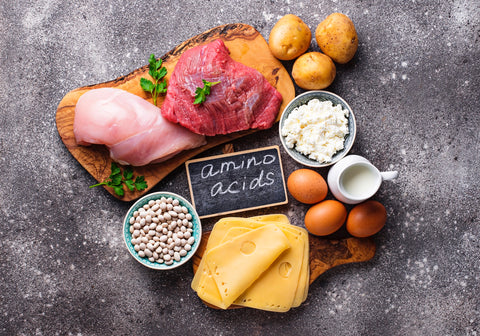What is glutamine?
Glutamine is a member of the amino acid family. Scientists also call it "L-glutamine". It is one of the nutrients that our body has the ability to manufacture.
According to specialists, there is a high proportion of glutamine in the blood compared to other amino acids. It is also found in abundance in the body's muscles. Glutamine plays a major role in the body.
For example, it has two important actions. The first is its importance in protein synthesis. The second concerns the permeability of the intestinal wall.
Where does glutamine come from?
As mentioned above, some glutamine is produced by the body itself. For this reason, glutamine is said to be a non-essential amino acid. The other part of glutamine is supplied by the diet.
Filling up on glutamine also requires a healthy, balanced diet. In particular, by judiciously selecting the foods that enter our mouths.

Foods rich in glutamine include meat, fish and eggs. These foods provide a good dose of protein.
We should also mention dairy products such as yoghurts and cheeses. Glutamine is also found in plants.
You'll find it in legumes and cereals, for example. It is present in vegetables such as parsley, cabbage and spinach.
It's up to you to select your glutamine source according to the foods you prefer. Food supplements can also be a serious source of glutamine. glutamine.
Wherever it comes from, this amino acid is necessary for the body.
Let's talk about the benefits of glutamine.
What are the benefits of glutamine?
Here are two important benefits of glutamine for human beings.
An important amino acid for every athlete

Muscles are made up of almost 60% glutamine, so it's important to consume it during regular physical activity.
Athletes are exposed to a great deal of training to improve their performance or stay in shape. This can lead to glutamine deficiency.
That's why regular consumption of glutamine can help avoid such deficiencies and the associated problems.
Glutamine promotes cellular recovery in muscles, and also contributes to the development of muscle tissue.
In fact, glutamine is a serious ally for athletes.
An ally for your digestion

Glutamine has a proven positive effect on the digestive system. This is why glutamine is recommended for irritable bowel syndrome. It is also useful for people with food intolerances.
Glutamine improves the impermeability of the intestinal wall. As a result, it allows only the nutrients our body needs to pass through, and limits toxins.
This ensures the immune system functions properly. (Over 50% of the body's immune cells are concentrated in the intestine).





